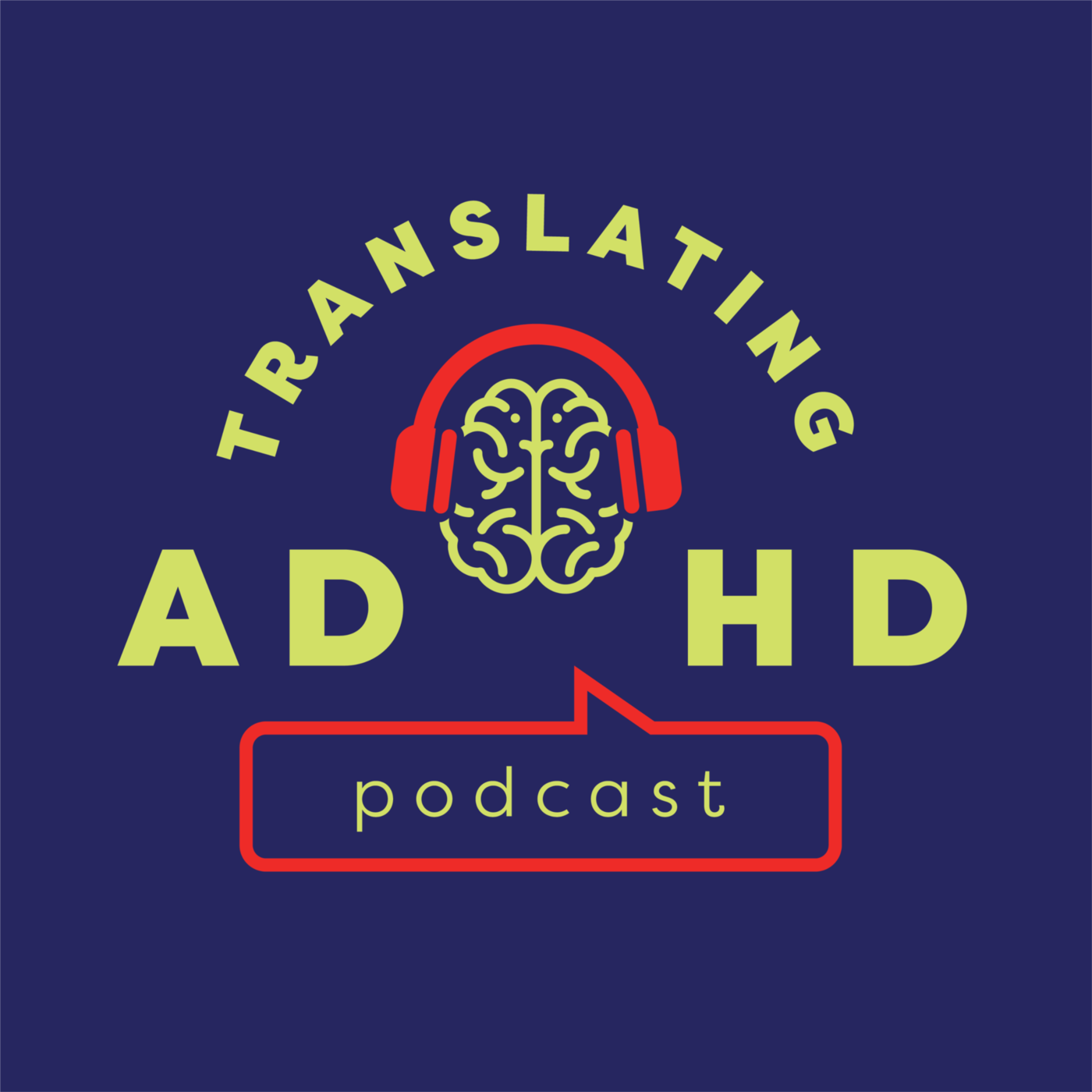
1.4M
Downloads
268
Episodes
We believe that success with ADHD is possible... with a little translation. Hosts Asher Collins and Dusty Chipura, both ADHD coaches who have plenty of insight to share navigating their own ADHD experiences, discuss how to live more authentically as an adult with ADHD and how to create real, sustained change to achieve greater success. If you are an adult with ADHD who wants more out of their business, career, and life, this is the podcast for you!
Episodes
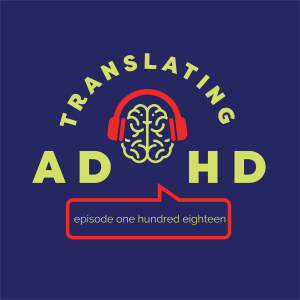
Monday Mar 07, 2022
Cultivating a Practice of Articulation with ADHD
Monday Mar 07, 2022
Monday Mar 07, 2022
ADHD, with its related verbal working memory/EF challenges, makes it difficult to put words to an experience. In coaching, we create a safe space for a client to explore their ADHD experience with new meaning. Articulation is a part of a reflective practice, to pause and reflect on an experience and extract the learning to take forward. Cam and Shelly describe this practice as a dance and lay out some of the basic dance steps to get started. They introduce a concept of positive accountability and they share examples of how articulation can be beneficial on either side of an action or activity, discussing how this practice can be done outside the realm of a coaching relationship.
Episode links + resources:
For more of the Translating ADHD podcast:
- Episode Transcripts: visit TranslatingADHD.com and click on the episode
- Follow us on Twitter: @TranslatingADHD
- Visit the Website: TranslatingADHD.com
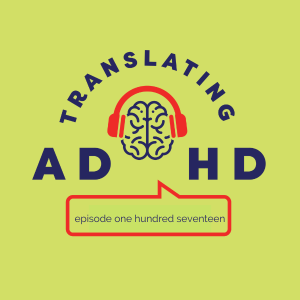
Monday Feb 28, 2022
Bigger Perspective Work with ADHD: A Client Scenario
Monday Feb 28, 2022
Monday Feb 28, 2022
Shelly and Cam continue in the vein of cultivating a practice and perspectives, looking at deeper perspective work over a longer period of time. People change and grow. The worlds and realities they create and live in change too. It only makes sense that their thinking evolves with that change. This is at the root of perspective - how we look at a situation is just as relevant and informing as the actual situation. There is a plethora of scientific data that supports how exploring mindset can better inform one’s experience.
Shelly brings a client example of perspective work over the span of a coaching session illustrating how perspectives can serve us in one period of our lives but no longer serve us as our situation changes and evolves. Shelly’s client shares how her “Solutions Focused” perspective served her well early in her sustainability initiative but then became more of an impediment as her situation changed. Shelly shares the relevance of a practice of incremental change and how we can generate evidence from our experiences to inform our mindset. The practice of Pause Disrupt Pivot is discussed as is a reflective practice. Individuals with ADHD with our ‘mode preference’ behavior can lock into a specific mindset missing an opportunity to take a step back and consider a better way to see a situation. A program note: This is not about just thinking positive AKA toxic positivity, it's about seeing oneself in their picture to create agency and empower change.
Episode links + resources:
For more of the Translating ADHD podcast:
- Episode Transcripts: visit TranslatingADHD.com and click on the episode
- Follow us on Twitter: @TranslatingADHD
- Visit the Website: TranslatingADHD.com
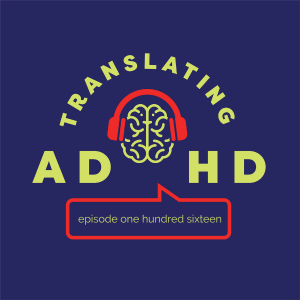
Monday Feb 21, 2022
Cultivating a Practice: Perspective Shifts and ADHD
Monday Feb 21, 2022
Monday Feb 21, 2022
Cam and Shelly step into their first deep dive into the greater cultivating a practice theme with an exploration of perspective work, a core element of ADHD coaching. When one thinks of cultivating a practice one can think of an action or a strategy and how to step into a task or behavior. With ADHD it is also important to develop a practice or habit of stepping back from a situation or experience.
Stepping back is a reflective practice and allows us to view how we are looking at a dilemma or a situation. How we are looking at a situation is as important if not more important than the actual situation. Are you looking at something from a One Down perspective? A place of shame or fear? What is it to view it as an equal? To view it from a core value?
This is perspective work and perspectives matter because they are ultimately tied to motivation and seeing oneself in the picture. Shelly shares one of her first coaching sessions where she experienced a client’s perspective shift around time. Perspective shifts are about awareness in a different way and Shelly as her younger coach was amazed at how the client shifted her thinking around a recurring dilemma which then motivated her to address the problem proactively. Shelly pulls in our pause, disrupt, pivot process and how it can help with perspective shifts and also suggests listeners to focus in one small area of their lives with their practice here.
Episode links + resources:
For more of the Translating ADHD podcast:
- Episode Transcripts: visit TranslatingADHD.com and click on the episode
- Follow us on Twitter: @TranslatingADHD
- Visit the Website: TranslatingADHD.com
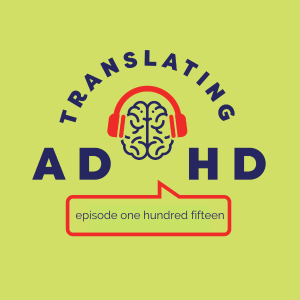
Monday Feb 14, 2022
Cultivating a Practice with ADHD
Monday Feb 14, 2022
Monday Feb 14, 2022
Hosts Shelly Collins and Cameron Gott pivot away from their exploration of emotions and emotional dysregulation and introduce a central coaching element - Cultivating a Practice. They lay out general concepts of developing a practice, distinguishing universal practices from more selective individual practices. Cam and Shelly introduce the idea of a practice mindset and discuss how perspective work in coaching is a good place to start when wanting to introduce a new practice.
Cam and Shelly integrate their Pause, Disrupt, Pivot model and share stories about how their own clients develop a practice of first shifting their thinking prior to creating downstream change and agency. Cam shares a theater metaphor as a way to get perspective or distance on a feeling or a narrative. Like locking into an emotional mode, those with ADHD can lock into a familiar narrative or story that then influences outcomes. Finally, Shelly shares a few of the upcoming topics including mantras or affirmations.
Episode links + resources:
For more of the Translating ADHD podcast:
- Episode Transcripts: visit TranslatingADHD.com and click on the episode
- Follow us on Twitter: @TranslatingADHD
- Visit the Website: TranslatingADHD.com
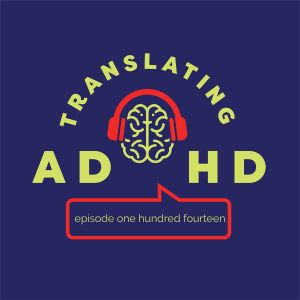
Monday Feb 07, 2022
Emotional Modes with ADHD: Empathy
Monday Feb 07, 2022
Monday Feb 07, 2022
Shelly and Cam continue to explore emotions beyond ‘emotional dysregulation’ looking at a phenomenon they call emotional modes. Because of emotional variability and volatility, those with ADHD can be prone to ‘lock’ into a preferred emotional stance. They illustrate this autopilot approach by looking at how empathy tends to present in their own client population.
Cam shares how he sees two distinct polar presentations of empathy - too much empathy for others with zero empathy for self or zero empathy for others resulting in isolation and lack of connection. Shelly brings in a metaphor of a swinging pendulum to describe this empathy imbalance and how listeners can start to loosen the emotional lock down and let the pendulum swing to allow for empathy for self and empathy for others. The hosts pull concepts from earlier shows like ‘seeing oneself in the picture’ and the importance of developing a curious practice to further explore the dilemma.
Episode links + resources:
For more of the Translating ADHD podcast:
- Episode Transcripts: visit TranslatingADHD.com and click on the episode
- Follow us on Twitter: @TranslatingADHD
- Visit the Website: TranslatingADHD.com
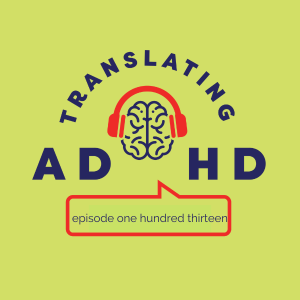
Monday Jan 31, 2022
Cultivating Trust in Relationships with ADHD
Monday Jan 31, 2022
Monday Jan 31, 2022
Shelly and Cam continue their exploration of the connection between positive emotions and positive structures. This week they focus on supportive people and cultivating trust in a relationship. Shelly shares a story where a client’s definition of trust evolves as she navigates hardship, setbacks and trauma to eventual learning and change regarding a desire to help her community in need. Listen for the client’s own ‘translating’ work as she redefines what trust actually is for her.
In relationships, those of us with ADHD can lead with hope and intention, but without clear needs, agreements and active boundary work, we can find ourselves in the familiar territory of overextension, rejection and lost trust. Converting hard learning into new awareness can be a struggle, but in developing a reflective practice and accessing resources, one can move to a new place of awareness and engagement based on personal needs and values.
Episode links + resources:
For more of the Translating ADHD podcast:
- Episode Transcripts: visit TranslatingADHD.com and click on the episode
- Follow us on Twitter: @TranslatingADHD
- Visit the Website: TranslatingADHD.com
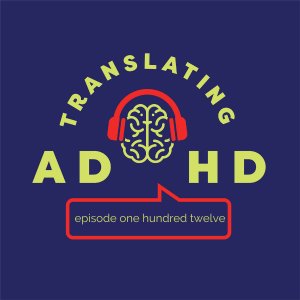
Monday Jan 24, 2022
Positive Emotions and Positive Structures with ADHD
Monday Jan 24, 2022
Monday Jan 24, 2022
As Shelly and Cam shift in the direction of the role of positive emotions in motivation and activation, they pause to consider the importance of positive structures. It’s almost impossible to embrace and utilize positive emotions like hope, curiosity and love if the signal of negative emotions, like anger or shame, is still too intense and if one has not considered positive emotions in the context of positive structures. Those of us with ADHD are masterful at responding and reacting to negative structures to create urgency and to activate an adrenaline/dopamine response. This approach comes at a great cost, though. As stress and anxiety build, our ability to utilize this consequence-based motivation system starts to diminish.
Positive structures are something Cam discovered in a state of burnout while teaching and again while building his coaching business. He realized that his fuel source of negative emotion and negative structures couldn’t propel him any farther. With little options, he turned to being curious about bigger contextual questions and his bigger Why. This is the land of values, needs and purpose. Cam realized important personal values of learning and education and that shifting to a positive mindset and utilizing positive emotions started with considering positive structures like core values and positive outcomes.
Episode links + resources:
For more of the Translating ADHD podcast:
- Episode Transcripts: visit TranslatingADHD.com and click on the episode
- Follow us on Twitter: @TranslatingADHD
- Visit the Website: TranslatingADHD.com
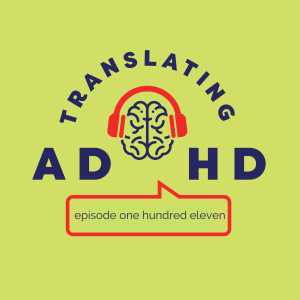
Monday Jan 17, 2022
Opening the Door to Positive Emotions with ADHD
Monday Jan 17, 2022
Monday Jan 17, 2022
This week Cam and Shelly pivot from the recent focus on negative emotions to positive emotions. Emotions are the on-off switch for action. Understanding how emotions come into play is key to motivation and taking action. Those of us with ADHD tend to over-utilize our fear neural networks or negative emotions to get things done. How often do you hear yourself prioritizing or taking action through urgency or on the greatest consequence? How often does worry, fear or anxiety inform what you are trying to do?
Accessing this negative neural network too much leads to stress and health issues. Starting to access the positive neural network can help to reverse this process. Cam and Shelly start by introducing the ‘gateway’ emotions of hope and curiosity. These are the emotions that can lead to other positive emotions like trust, gratitude and love. Cam reads a letter from an appreciative listener and discusses how developing community and understanding of the dilemma can instill a sense of hope and possibility. Shelly discusses how the skill of normalizing can make someone start to understand their ADHD experience and why in coaching it is important to articulate a picture of positive success.
Episode links + resources:
For more of the Translating ADHD podcast:
- Episode Transcripts: visit TranslatingADHD.com and click on the episode
- Follow us on Twitter: @TranslatingADHD
- Visit the Website: TranslatingADHD.com
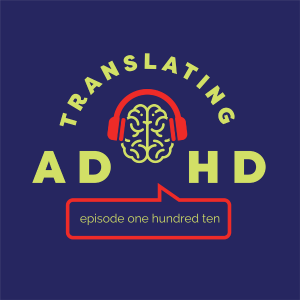
Monday Jan 10, 2022
Big Signal Emotions with ADHD: Rejection
Monday Jan 10, 2022
Monday Jan 10, 2022
This week we continue our exploration of big signal emotions as we explore rejection. Cam and Shelly discuss that with ADHD on board it’s not just rejection, but the fear of rejection that has the biggest impact.
Cam and Shelly discuss the relationship between fear and rejection and how rejection comes from a place of fear. To examine this more closely, Cam takes listeners back to a time in life when he felt rejected frequently despite the fact that he was not being rejected. Cam felt rejected at work because he was in a role where he struggled with things that his colleagues managed easily. He walks through his perceptions and emotional responses in this time period that lead to a feeling of rejection where no rejection existed. To contrast Cam’s story, Shelly introduces some examples of times in her life when she has experienced real rejection.
With ADHD on board, we often miss nuance and distinction. Using our contrasting examples of real and perceived rejection, we discuss how to distinguish between real and perceived rejection. We also discuss looking at the nuance to determine whether we are being wholly rejected and whether we want to be included in the place we are experiencing rejection.
Episode links + resources:
For more of the Translating ADHD podcast:
- Episode Transcripts: visit TranslatingADHD.com and click on the episode
- Follow us on Twitter: @TranslatingADHD
- Visit the Website: TranslatingADHD.com
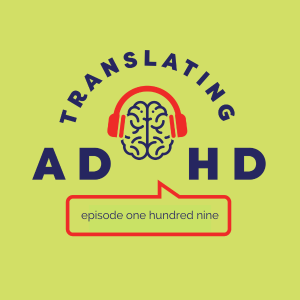
Monday Jan 03, 2022
Big Signal Emotions with ADHD: Shame
Monday Jan 03, 2022
Monday Jan 03, 2022
This week we return to our exploration of big signal emotions as we dig into shame. Shame is no stranger for those of us living with ADHD. Shame is often the root of many downstream emotional responses, like imposter syndrome and rejection sensitivity. As one walks through the world with an invisible disability like ADHD, one can see how shame can manifest. Cam and Shelly discuss how years of dismissal and rejection, deliberate and not, and years of struggling to explain or account for the unexplainable, plant the seeds of shame. Cam and Shelly share how factors like isolation, fear and trauma will contribute to the development of shame and how ADHD and emotional dysregulation heighten a shame response.
The First Barrier of ADHD is the barrier to new awareness. Emotions like shame, and blame in a previous episode, can cloud our judgment, disrupt our own agency and take us offline down some negative emotional rabbit hole (or one of our Valley experiences). When we explore emotions in a safe and curious way, locate a supportive community and bring new language to our emotional experiences we can start to dissolve the effects of emotions like shame.
Episode links + resources:
For more of the Translating ADHD podcast:
- Episode Transcripts: visit TranslatingADHD.com and click on the episode
- Follow us on Twitter: @TranslatingADHD
- Visit the Website: TranslatingADHD.com
